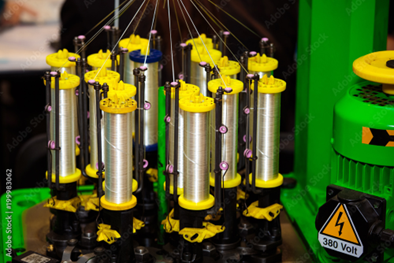Do you have a requirement that is unique? Conneaut’s diverse capabilities can help. Send us your needs or call 1 (800) 955-9276
Conneaut has developed process expertise in precision winding, twisting, plying, cabling, and bunching of all textiles types to achieve specific customer solutions. Materials typically available are; Fiberglass, Aramids, Cotton, Polyester, Nylon, PTFE Coated Fiberglass and many other specialty manmade and natural fibers
Our experience and process capabilities allow us to process a very wide range of fiber deniers from 40d to 12,000d


Our twisting capabilities are very diverse to allow us to combine 2 ends or many ends on a varieties of bobbin/tubes that fits your process.
| Description | Construction |
|---|---|
| ECD900 | 1/0 |
| ECD900 | 1/2 |
| ECD450 | 1/0 |
| ECD450 | 1/2 |
| ECD450 | 1/3 |
| ECD450 | 2/2 |
| ECD450 | 4/5 |
| ECE225 | 1/0 |
| ECE225 | 1/2 |
| ECE225 | 1/3 |
| ECE225 | 2/4 |
| ECG150 | 1/0 |
| ECG150 | 1/2 |
| ECG150 | 1/3 |
| ECG150 | 2/2 |
| ECG150 | 3/3 |
| ECG75 | 1/0 |
| ECG75 | 1/2 |
| ECG75 | 1/3 |
| ECG37 | 1/0 |
| ECG37 | 1/2 |
| ECG37 | 1/3 |
Do you have a requirement that is unique? Conneaut’s diverse capabilities can help. Send us your needs or call 1(800)955-9276

Precision parallel wound Polyglass or all glass for over wrapping of magnet wire.


| Item | Description | Configuration | Package |
|---|---|---|---|
| Polyglass 471 | DG471 | 6-32 Ends | 5051, 5052, 5036 |
| Polyglass 941 | DG941 | 6-32 Ends | 5051, 5052, 5036 |
| All Glass D450 | ECD450 1/2 | 6-32 Ends | 5051, 5052, 5036 |
| All Glass D900 | ECD900 1/2 | 6-32 Ends | 5051, 5052, 5036 |
| All Glass D450 | ECD450 1/0 | 6-32 Ends | 5051, 5052, 5036 |
| All Glass D900 | ECD900 1/0 | 6-32 Ends | 5051, 5052, 5036 |
Do you have a requirement that is unique? Conneaut’s diverse capabilities can help. Send us your needs or call 1(800)955-9276

Our twisting allows to produce various OD requirements.
 |
 |
 |
Cordages
Available on 8570 Bobbin (milk bottle) or double flange wood spool (14″ or 19″)
| Diameter | Yield | |||
|---|---|---|---|---|
| Construction | Inch | mm | Yds/lb | Denier |
| 37/10 | 0.041 | 1.041 | 366 | 12,198 |
| 37/12 | 0.045 | 1.143 | 305 | 14,638 |
| 37/16 | 0.052 | 1.321 | 229 | 19,496 |
| 37/24 | 0.064 | 1.626 | 152 | 29,372 |
| 37/30 | 0.071 | 1.803 | 122 | 36,594 |
| 37/36 | 0.078 | 1.981 | 102 | 43,770 |
| 37/40 | 0.082 | 2.083 | 91 | 49,060 |
| 37/48 | 0.090 | 2.286 | 76 | 58,743 |
| 37/64 | 0.104 | 2.642 | 57 | 78,324 |
Can be supplied with lube and or tack as required.
| Item | Construction |
|---|---|
| Aramid Ripcord 3000 | 1000 1/3 |
| Aramid Ripcord 4500 | 1500 1/3 |
| Polyester 3000 | 1000 1/3 |
| Polyester 4500 | 1500 1/3 |
Conneaut has a broad range of commonly used textile yarns, such as; Aramids, Cottons, Fiberglass, Polyesters, Nylons and PTFE coated fiberglass. But it doesn’t stop there, Conneaut has experience with many High performance yarns such as Ultra-High Molecular Weight Polyethylene (UHMWPE), Ultra-Fine Fiberglass, S2-Glass Fiberglass, PTFE Yarn and Meta-Aramids.
We know unique products and applications require unique and custom solutions.
Conneaut has a long history of development with new and innovative fibers. Conneaut can readily source the high performance yarns you require. And with our diverse and flexible manufacturing capabilities we can provide the product and solution you need.
Contact us with your needs and let our team help develop the solution you need.
Reach out to us today with your needs and we will work with you to develop the solution the best meets your needs.
| Fiberglass | Polyester | Aramid | Cotton | Nylon |
|---|---|---|---|---|
| ECD450 | 840d | 1000d | 10/1 | 210d |
| ECE225 | 1000d | 1500d | 12/2 | 400d |
| ECG150 | 1300d | 20/1 | 840d | |
| ECG75 | 1500d | 30/1 | ||
| ECG37 | 36/1 | |||
| ECH55 | ||||
| ECH18 | ||||
| SCG150 | ||||
| SCG75 | ||||
| SCD450 |
| Tube Type | Size | Common Application |
|---|---|---|
| Cardboard | 5/8″ID x 2-3/4″ | Braiding |
| Cardboard | 5/8″ID x 4-1/4″ | Braiding |
| Cardboard | 5/8″ID x 4-3/4″ | Braiding |
| Cardboard | 5/8″ID x 5-1/4″ | Braiding |
| Cardboard | 5/8″ID x 5-3/4″ | Braiding |
| Wood Reel | 1.5″ Id x 14″ OD | Filler, Wire Cabling |
| Wood Reel | 1.5″ Id x 19″ OD | Filler, Wire Cabling |
| Wood Reel | 1.5″ Id x 24″ OD | Filler, Wire Cabling |
| Plastic Serving | 1.6″ ID x 6″ OD x 6″ Trav | Magnet Wire |
| Plastic Serving | 1.6″ ID x 6″ OD x 3″ Trav | Magnet Wire |
| 8512 Bobbin | 1.6″ ID x 10.6″ Tall x 4.3″ Base | Weaving / Knitting |
| 8540 Bobbin | 2.4″ ID x 13.25″ Tall x 6″ Base | Weaving / Knitting |
| 8570 Bobbin | 3.3″ ID x 17″ Tall x 7.7″ Base | Weaving / Cordage |


